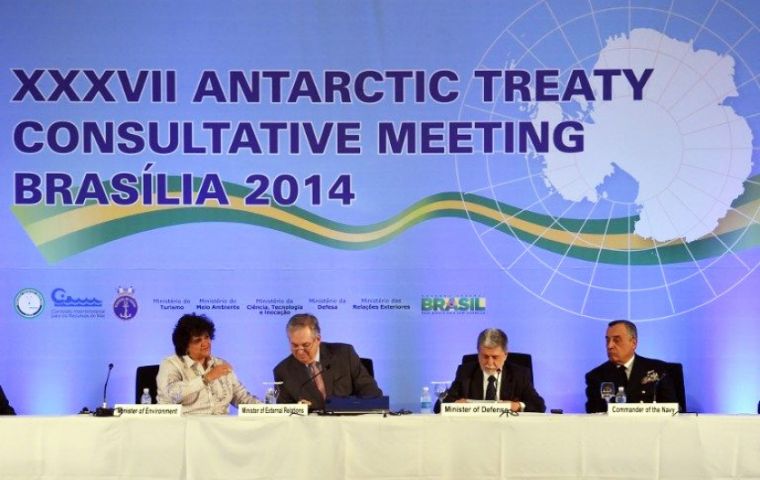MercoPress. South Atlantic News Agency
Strong commitment to support Marine Protected Areas in Southern Ocean
 The Antarctic Treaty Consultative Meeting delegates in Brasilia also backed the IMO 'polar code' draft
The Antarctic Treaty Consultative Meeting delegates in Brasilia also backed the IMO 'polar code' draft  ASOC's Mark Epstein said ”it is high time that CCAMLR approves the two MPA proposals that have been on the table for three years.”
ASOC's Mark Epstein said ”it is high time that CCAMLR approves the two MPA proposals that have been on the table for three years.” The Antarctic and Southern Ocean Coalition (ASOC) joined member states of the Antarctic Treaty, along with observer and expert organizations, in Brasilia this week to discuss measures for the protection of the Antarctic environment.
ASOC Executive Director Mark Epstein praised the cooperation of Antarctic Treaty Consultative Meeting (ATCM) delegates in advancing important issues, including supporting the need for new marine protected areas in the Southern Ocean.
The ATCM discussed issues of marine protection, although most decisions on this topic are made by a different but related organization, the Commission for the Conservation of Antarctic Marine Living Resources (CCAMLR).
With efforts to create marine protected areas (MPAs) in the Ross Sea and East Antarctica continuing at CCAMLR’s annual meeting in October 2014, ASOC's Mark Epstein noted, “ATCM member countries sent a strong message of support to CCAMLR for designating MPAs in the Southern Ocean. It is high time that CCAMLR approves the two MPA proposals that have been on the table for three years.”
Additionally, the growing threat of climate change was a focus of discussions, with ATCM continuing its commitment to completion of a climate change response work plan. Delegates agreed that increasing awareness of the global impacts of climate change in Antarctica was a critical task. ASOC also brought to the attention of the ATCM the results of some recent research on black carbon impacts on Antarctica.
Global reductions in those emissions could limit sea level rise and temperature increases. ASOC stressed that the scientific consensus on climate change was clear and that Parties must act immediately, both in the Antarctic and globally, to reduce the impact of carbon emissions on the environment.
Further, ASOC encouraged Parties to the Antarctic Treaty to use research opportunities in Antarctica to investigate climate change.
The ATCM further noted that the International Maritime Organization (IMO) was close to final regulations governing vessels traveling in Antarctic and Arctic seas, known as the Polar Code.
While supporting the work of the IMO, ASOC’s Secretariat Director Claire Christian stressed the importance of moving swiftly to incorporate other types of vessels (including fishing vessels) into the Code, stating “recent fishing vessel incidents in the Southern Ocean, some of them involving fatalities, clearly point towards the need to ensure that all ships traveling in these waters are sufficiently prepared for polar conditions.”
Discussions on the regulation of tourism, which is a growing activity in the Antarctic, continued at the ATCM but, as in recent years, they did not make any substantive decisions.
“Treaty parties need to take actions that would enable them to shape tourism developments, particularly those that have environmental effects, rather than reacting to these developments as is currently the case” said Dr. Ricardo Roura of ASOC.
The Antarctic Treaty Consultative Meetings convene annually for eight days to discuss legal and institutional issues, operational issues, and tourism, while the Committee for Environmental Protection (CEP), an advisory body to the ATCM, meets concurrently to discuss environmental issues. These bodies make decisions by consensus.
There are currently 29 Antarctic Treaty Consultative Parties, 21 Antarctic Treaty Non-Consultative Parties, and 35 CEP Members.
CCAMLR has been discussing the adoption of MPAs in the Southern Ocean for nearly a decade. While early on CCAMLR made steady progress on the adoption of MPAs, it has failed to reach consensus on the adoption of two concrete proposals for East Antarctica and the Ross Sea, covering several million square kilometers, at three meetings since October 2012. Finally 23 out of 25 CCAMLR members are also Antarctic Treaty Consultative Parties.




Top Comments
Disclaimer & comment rules-

-

-

Read all commentsI seem to remember that Russia was instrumental in blocking the Marine Protection Areas of the South Atlantic. That is not likely to change any time soon. The Ukraine affair is heading us all off into a Cold War stalemate where little good can be done for the environment as the parties use the issue a pawn in the game of power politics.
May 09th, 2014 - 11:39 am 0When resources start to run out, the mighty greedy power hunting expansionism of the big powers will slowly but surely look deep south,
May 09th, 2014 - 12:45 pm 0And these agreements and treaties will look more and more worthless,
I could be wrong, but power hungry greed is never far away..
They are not pacifying the South Atlantic, are they?
May 12th, 2014 - 12:02 pm 0TMBOA won't like that.
Commenting for this story is now closed.
If you have a Facebook account, become a fan and comment on our Facebook Page!